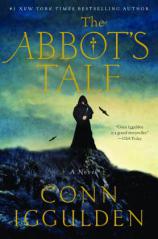The Abbot's Tale
Review
The Abbot's Tale
What an incredible character Dunstan is. Normally, I’d dance around that statement using fancy language and lead into it with something clever or anecdotal. This time, there’s no dancing around the simple fact of the matter. Say anything else you want about Conn Iggulden’s THE ABBOT’S TALE, but Dunstan --- charged with charisma and as unreliable as unreliable narrators come --- is nearly without peer in the character development department. I can guarantee you with absolute certainty that if I didn’t have an entire book to review, I’d gush about him for the rest of the time that you’re here, dear reader.
Part hagiography, part historical fiction, THE ABBOT’S TALE is the story of (you guessed it!) Dunstan, a talented and ambitious man of the Church who grows to shape a burgeoning England in more ways than one. What makes him such a compelling character goes beyond his achievements, however spectacular they may be (example: heading the design and construction of the cathedral at Canterbury). Though a Benedictine monk, a devout priest, and eventually an archbishop appointed by the king --- positions marked by virtue --- Dunstan is flawed. Very flawed. From the opening moments of this abbot’s tale, Iggulden makes it perfectly clear that aside from all his titles, Dunstan is first and foremost a man --- an unpredictable man of immense intelligence and willpower. And that makes him as fascinating as he is dangerous.
"[T]here’s no denying that [Iggulden] has crafted an intimate and unforgettable character portrait. Historical fiction though it may be, I can say with confidence that there have been few minds quite like Dunstan’s."
Because Dunstan is such a looming presence, however welcome it may be, several of the secondary characters feel glossed over at times. I can understand Iggulden’s discretion, this being THE ABBOT’S TALE and Dunstan being the titular abbot. Even so, it would have been nice for some of the others to have more time in the limelight, especially since what we learn of them is often quite interesting. This is not to say that there aren’t secondary characters who don’t have an impact; Dunstan’s brother, Wulfric, and King Edmund are two standouts who get their due. Overall, though, it felt like there were many missed opportunities. Dunstan may be a singular character, but he is as defined by those he surrounded himself with throughout his life as anything else.
Where I don’t necessarily agree with Iggulden’s discretion is in terms of how heavily he leans towards narration and description over scenes and dialogue, which ties back to the secondary character grievance. Often, we’ll be introduced to someone in a wonderfully written scene, only to encounter that someone again in (almost) exclusively dialogue-less scenarios. At times, an important character’s death only gets a paragraph or two before moving along, which just feels…wrong. Play it up to the fact that death was so common in the 10th century that people may have been somewhat desensitized to it, or the fact that Dunstan constantly reiterates how short a time we have on earth, but I wasn’t a fan.
Worry not, though: THE ABBOT’S TALE has merit beyond Dunstan’s characterization alone, I can assure you. Iggulden’s writing style is rich and accessible, detailing young England and its people in a way that makes the thousand-year gap feel obsolete. Undoubtedly as real a world as our own, it may appear vastly different on first glance, though a closer look will reveal the similarities. War, politics, religion, scandal --- are these not things we contend with every day, either through the news or in our own lives? The specifics differ, of course, but as they say, history repeats itself, and Iggulden posits that we could learn a lot from it in ways that don’t interfere with the larger story.
Speaking of which, even more impressive than Iggulden’s writing is his knack for storytelling. A huge reason Dunstan is so successful as a character is that his life reads like, well, a life. St. Dunstan is an actual historical figure, but that’s not the point. The point is, even if you’ve never heard of him before --- I hadn’t until this book --- the way he grows and changes is no different from how we grow and change. The best autobiographies and memoirs read like narratives rather than dry accounts of what happened, and that is the storytelling method adopted here. It would have been no surprise to me if this had been a translation of documents over a millennium old, as Iggulden jokes about in the beginning.
Ultimately, even where I disagree with Iggulden’s discretionary sense, there’s no denying that he has crafted an intimate and unforgettable character portrait. Historical fiction though it may be, I can say with confidence that there have been few minds quite like Dunstan’s. Whether that’s a good or bad thing is the question --- and one reason among many for you to dive into THE ABBOT’S TALE yourself.
Reviewed by Benny Regalbuto on June 1, 2018
The Abbot's Tale
- Publication Date: October 8, 2019
- Genres: Fiction, Historical Fiction
- Paperback: 480 pages
- Publisher: Pegasus Books
- ISBN-10: 1643132342
- ISBN-13: 9781643132341




